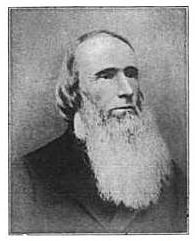Epitaph of the eminent barrister Sir John Strange:
Here lies an honest lawyer,–
that is Strange.
From Epitaphiana: or, The Curiosities of Churchyard Literature, 1873.
Epitaph of the eminent barrister Sir John Strange:
Here lies an honest lawyer,–
that is Strange.
From Epitaphiana: or, The Curiosities of Churchyard Literature, 1873.

Can a man imagine himself witnessing his own funeral? Antony Flew writes:
The crux is that there is a world of difference between: on the one hand, imagining what it would be like to witness my own funeral; and, on the other hand, imagining what it would be like for me to witness my own funeral. … The question at issue is a question about possible pictures and possible captions. Everyone knows what picture fits the first caption. What picture is it which fits, and justifies, the second caption?
I can imagine what it’s like to be Napoleon. But can I imagine what it’s like for me to be Napoleon?
“Surely I can perfectly well imagine my own funeral, really my own funeral with my body in the coffin and not a substitute corpse or a weight of bricks; with me there watching it all, but invisible, intangible, a disembodied spirit? Well, yes, this seems all right — until someone asks the awkward question ‘Just how does all this differ from your imagining your own funeral without your being there at all (except as a corpse in the coffin)?'”
For out-and-out politeness commend us to Mr. Justice Graham, who when once presiding at the Old Bailey in the days when the law sent crowds to the gallows, had to sentence no less than sixteen prisoners to death. In reading out their names he inadvertently missed one — John Robins — and then with due solemnity exhorted them to prepare for their doom, and pronounced on each the sentence of death. The condemned left the dock, and his lordship’s attention was called to the fact that he had omitted to read John Robin’s name. ‘Bring him back,’ said the Judge. ‘By all means let John Robins step forward.’ Back came the unfortunate man, and Graham, addressing him in his singularly courteous manner, assured him that ‘the omission was purely accidental, and I ask your pardon for my mistake. I am very sorry, and can only add that you will be hanged with the rest.’
— Law Notes, March 1905
The four young stars of Rebel Without a Cause all died prematurely:
See Fallout.
At Frank Sinatra’s funeral, friends and family members were invited to place items of personal significance into his coffin. Reportedly these included:
Why 10 dimes? “He never wanted to get caught not able to make a phone call,” his daughter Tina told Larry King.

The son of William Henry Harrison, John Scott Harrison, served two terms in Congress but spent the rest of his life quietly on his farm in Ohio. At his interment there in 1878 it was discovered that an adjoining grave had recently been robbed, so Harrison’s son and nephew traveled to Cincinnati to seek the missing body.
They visited several medical schools but found nothing, and were about to give up when they noticed a tautened rope leading into chute in the dissecting room of the Ohio Medical College. On turning the windlass they brought up a naked body and discovered to their horror that it was Harrison himself, his body stolen somehow from a guarded brick vault less than 24 hours after his burial.
By a curious further coincidence, Harrison’s son Benjamin himself eventually grew up to be president, making John Scott Harrison the only man in history to be both son and father of a U.S. president. But no one knows who stole his body, how, or how it came to be suspended in that dissecting room.
But the superstitious noted that the death of Prince Albert Victor on a Thursday broke a remarkable spell or curse which had hung over the present royal family of England for more than a century and three-quarters — bringing about the death of all the prominent members of that family on Saturdays. William III died Saturday, March 18, 1702; Queen Anne died Saturday, August 1, 1714; George I died Saturday, June 10, 1727; George II died Saturday, October 25, 1760; George III died Saturday, January 29, 1820; George IV died Saturday, June 26, 1830; the Duchess of Kent died Saturday, March 16, 1861; the Prince Consort, husband of Queen Victoria and grandfather of the recent deceased Prince Albert Victor, died Saturday, December 14, 1861; Princess Alice of Hesse-Darmstadt, Victoria’s second daughter, and sister of Albert, died Saturday, December 14, 1878. The shadows which overhung the late prince’s life are said to have been darkened by a superstitious fear which caused him to keep close in-doors on Saturdays.
— William Shepard Walsh, Handy-Book of Literary Curiosities, 1892
In 1771, two heirs, a Mr. Pigot and a Mr. Codrington, made a wager as to whose father would die first. A friend computed the odds based on each father’s age, and when Codrington objected that these were unfair, the Earl of March agreed to stand in his place. They agreed that Pigot would pay March 500 guineas if his own father died before Sir William Codrington, and March would pay Pigot 1,600 guineas if Codrington died first.
Unfortunately, old Pigot was already dead — he had died at 2 a.m. that very morning. On learning this, his son refused to pay the wager, contending that the contract was void, “for there was no possibility of the defendant’s winning, his father being then actually dead, and therefore he ought not to lose.” But March sued him and won.
“It was sneakingly mean and inconsiderate in the old man to die in this underhand way, and thus subject his son, the companion of young noblemen, to the mortification of having bet against a dead certainty,” writes Irving Browne in Humorous Phases of the Law (1876). “But it was what you might expect of old Pigot, for the record does not show that he was of noble blood, and so we infer he was plebeian, and knew no better.”
A servant maid was sent by her mistress to Ben Johnson, for an epitaph on her departed husband. She could only afford to pay half-a-guinea, which Ben refused, saying he never wrote one for less than double that sum; but recollecting he was going to dine that day at a tavern, he ran down stairs and called her back. ‘What was your master’s name?’–‘Jonathan Fiddle, sir.’–‘When did he die?’–‘June the 22nd, sir.’ Ben took a small piece of paper, and wrote with his pencil, while standing on the stairs, the following:–
On the twenty-second of June,
Jonathan Fiddle went out of tune.
— Horatio Edward Norfolk, Gleanings in Graveyards, 1861
Last words of executed murderers:
In 1856, English murderer William Palmer stood on the gallows and asked, “Are you sure it’s safe?”